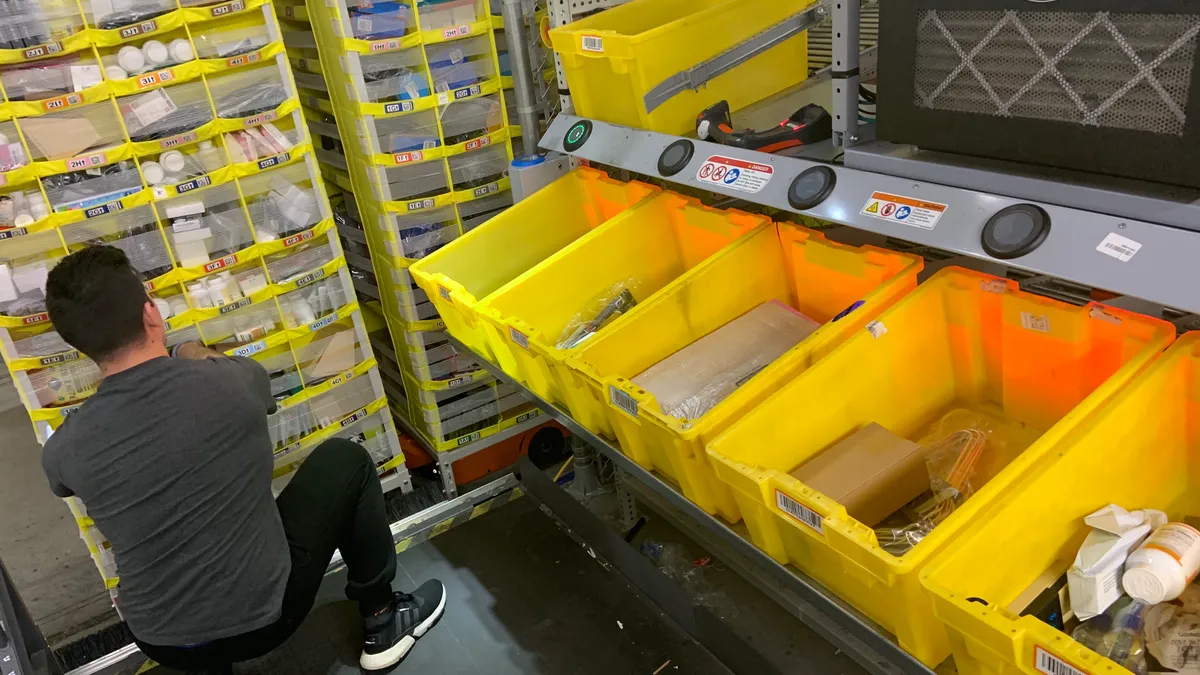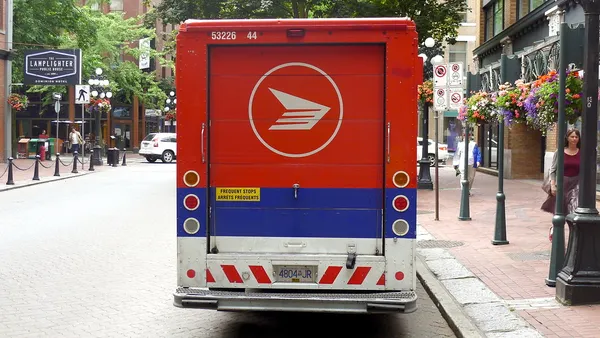UPDATE: April 24, 2020: Amazon has extended the closure of its distribution centers in France until Tuesday after a French appeals court amended and upheld the Court of Nanterre's original ruling, an Amazon spokesperson told Supply Chain Dive via email — countering a Reuters report that stated the closures would end on Saturday.
The appeals court reduced fines for non-compliance from one million euro ($1.08 million) per day to 100,000 euro ($108,075) per day, and expanded the definition of essential goods to include IT and office products, pharmacy and health items, food and beverages, and pet food and supplies, according to Le Monde.
Despite the reduced fine, "The potential court penalty outlined today means that even a rate of 0.1% of handling or shipping items that are not included in the judgement could lead to a fine of more than a billion euros per week," the spokesperson said. "Unfortunately this means we have no choice but to continue with the temporary closure of our French Fulfilment Centres while we evaluate how best to operate in light of the court’s ruling."
UPDATE: April 20, 2020: Amazon has extended the closure of its distribution centers in France "by at least a few days" pending its appeal case in a French court on Tuesday, according to a Seeking Alpha report released Sunday. Amazon did not respond to a request for comment on how long the closure is expected to last.
The retailer made the initial decision to close its facilities because with "the punitive 1M euro per incident fines imposed by the court, the risk of accidentally shipping non-essential items was too high," Amazon spokesperson Kelly Cheeseman told Supply Chain Dive via email.
"While we will do our best to minimize the impact on French small businesses, those who depend on our FC network to deliver their products will be negatively impacted by this ruling," she said, however Amazon will continue to serve customers in France through its independent marketplace sellers and third-party fulfillment networks.
Brief:
- Amazon will cease operations at its six distribution centers in France, according to multiple media reports, after the Court of Nanterre ruled on Tuesday the company must cease delivery of non-essential goods. The ruling came after a French labor union, Syndicale Solidaires, filed complaints about the company's worker safety measures, saying Amazon "had violated the withdrawal rights of employees" and alleging that the company threatened to suspend employee salaries, according to a statement sent to CNN.
- The court ruling, obtained by CNN, said Amazon failed to sufficiently protect employees and that it must conduct an assessment of the "occupational risks inherent in the Covid-19 epidemic" across its facilities. The company faces fines of 1 million euros ($1.1 million) per day until it reaches compliance. Amazon said it told all its distribution workers in France to stay home while it appeals the ruling, a move that temporarily suspends the court's non-essential goods order, according to Bloomberg.
- In the meantime, Amazon said it will continue to serve its customers in France "through independent companies that sell on Amazon" and its global distribution network, according to CNN.
Dive Insight:
An Amazon spokeswoman told CNN the "complexity inherent in our logistic activities" necessitated the closures, though Amazon has not clarified whether third-party or international facilities in the region will pick up the slack or what the impact will be. France is the third largest e-commerce market in Europe and Amazon accounted for an average of 40% of all e-commerce sales country-wide in March, according to data from Statista.
Supply chain experts at McKinsey and Prologis have recommended supply chain managers build redundancies into their warehousing network to shield against closures due to government orders or COVID-19 outbreaks among workers. Having these backups in place can enable companies to better reroute inventory through their networks and continue to serve customers, reducing the risk of stock-outs or delays.
Amazon temporarily suspended delivery of non-essential items in France, India and Italy in March as a result of increased demand for consumer goods during the COVID-19 pandemic. It also said it would prioritize delivery of essential goods in the U.S. and the U.K. until at least April 5, to cope with the increased volume. In the meantime, it has hired 100,000 new employees in warehousing and fulfillment roles, opening up another 75,000 in an announcement Monday.
The decisions have impacted third-party shippers who fulfill and send orders to customers via Amazon's platform. For those shipping goods deemed non-essential, deliveries have often been delayed, including those in Amazon Prime's two-day delivery category.
Many countries and U.S. states have designated warehouse operations as essential during the pandemic, meaning workers are often exposed to infection risks from touching surfaces or working in close proximity to others.
Amazon is facing challenges from labor unions in the U.S. after workers reported the company was not living up to its worker safety commitments, such as implementing social distancing and providing masks. The company has also had to close some New York facilities after an increase in COVID-19 infections.
Smithfield Foods, one of the nation's largest meat processors, faces similar challenges after an outbreak of 500 cases in its Sioux Falls, South Dakota, plant forced the company to close it Monday. The move sparked continuity fears up and downstream in American food supply chains as the plant represents up to 5% of U.S. pork production.
The disruption has compounded as Smithfield announced Wednesday it is closing two more plants, in Wisconsin and Missouri, due to an outbreak of additional COVID-19 infections among its workforce there.















